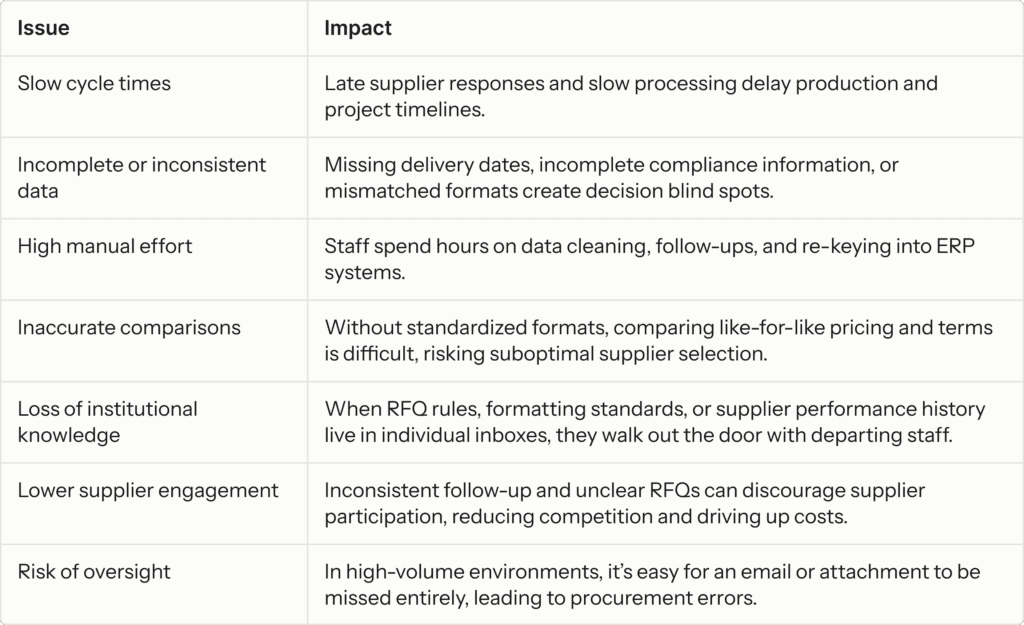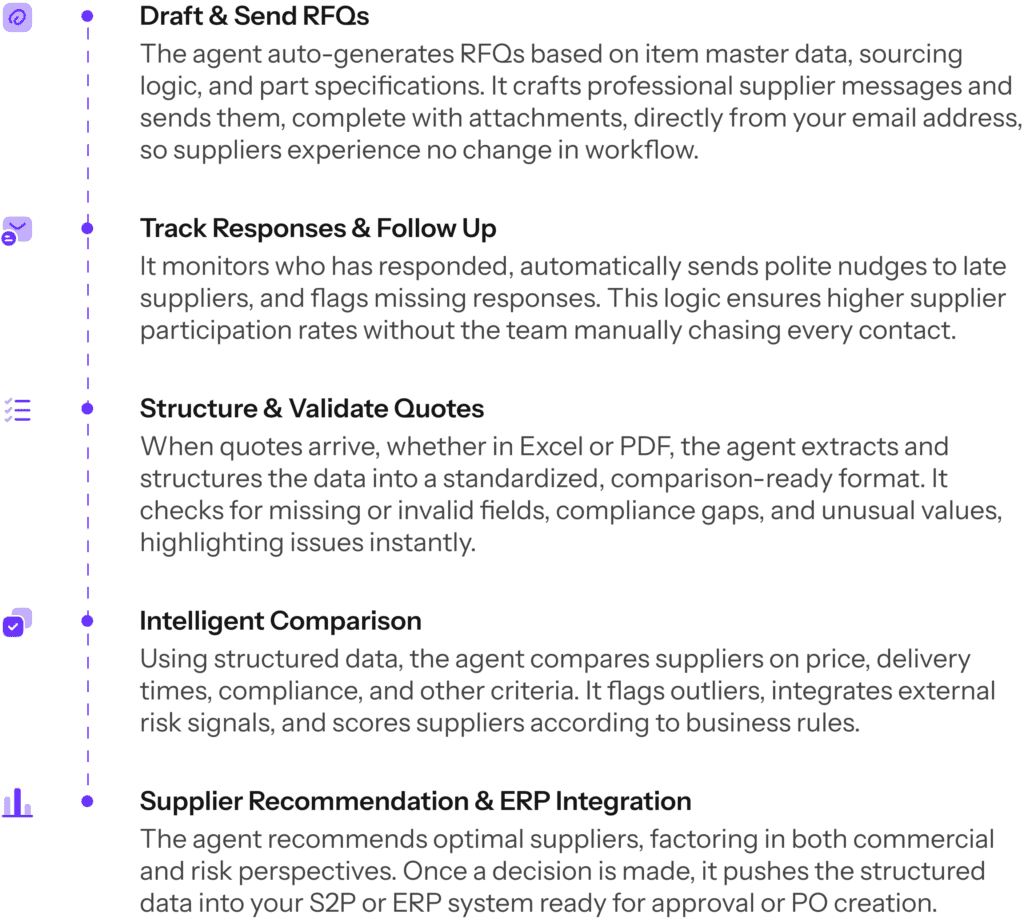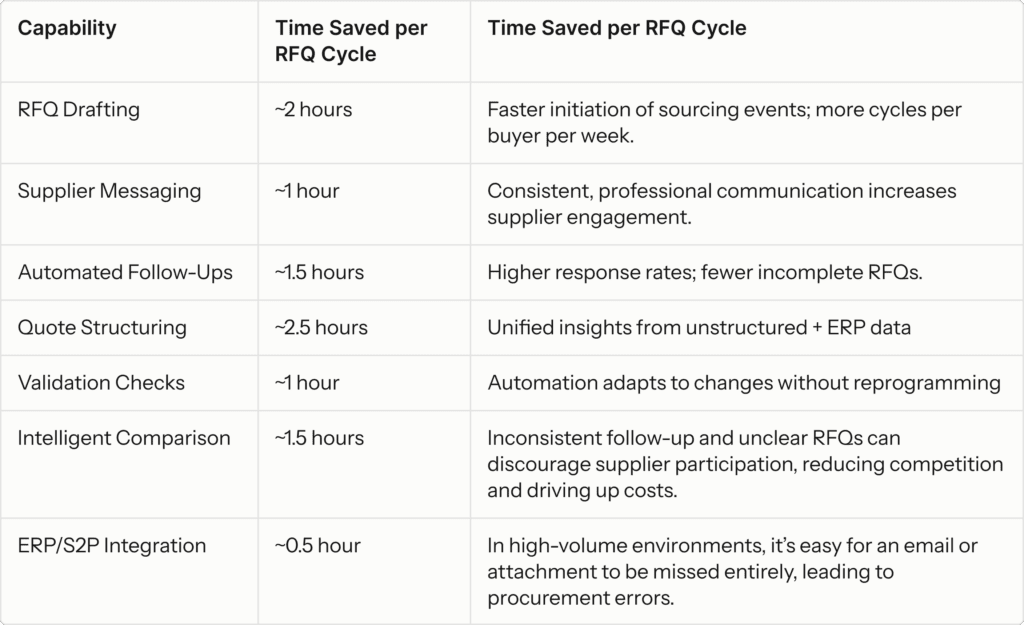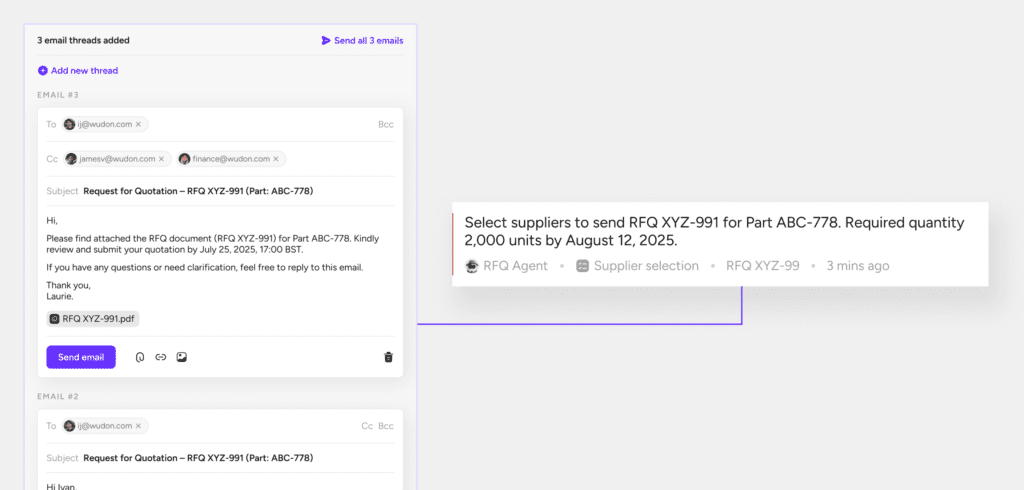
ANNOUNCEMENT
QAD Redzone acquires Kavida — our Agents have joined the Champion AI family

Discover how AI agents are reshaping the manufacturing operating model

Hi, I’m Alison!
Share your details, and I’ll give you a call in minutes to see how we can assist.

90% of RFQs Still Come by
Email — Here’s How the Agent Responds for You
Table of Contents
ToggleIn an era of digital transformation, procurement teams might assume the days of email-based sourcing are over. The reality is starkly different: 90% of RFQs (Requests for Quotation) still arrive via email. Despite the proliferation of Source-to-Pay (S2P) systems and procurement platforms, the inbox remains the beating heart of supplier communications.
Why? Because suppliers in complex, global supply chains are spread across geographies, industries, and levels of digital maturity. While some are happy to log into a buyer’s portal, the majority prefer the simplicity, familiarity, and ubiquity of email.
For procurement teams, however, this convenience for suppliers translates into complexity, delay, and administrative overload. Instead of strategic sourcing, buyers are stuck wrestling with sprawling threads, mismatched file formats, and endless manual tracking.
The RFQ problem isn’t that procurement professionals can’t handle email. The problem is that handling RFQs via email at scale is slow, error-prone, and limits the team’s ability to act strategically.
The RFQ Problem in Detail
The persistence of email-based RFQs stems from three realities:
Supplier-driven habits
Suppliers often work with dozens of customers. Using email allows them to manage incoming RFQs in a single, familiar environment.
Low barrier to participation
Unlike portals or proprietary systems, email doesn’t require new logins or training, making it faster for suppliers to respond.
Fragmented technology adoption
Even companies with advanced procurement software often find that their suppliers—especially SMEs—are not fully integrated into their systems.
For procurement teams, these realities have consequences:
RFQ creation
Often manual, whether or not a formal S2P system is in place. Teams recompile specs, line items, and terms from scratch.
Supplier outreach
Requires drafting, attaching, and sending bespoke emails, often tracked in sprawling spreadsheets.
Follow-ups
Chasing suppliers manually, with no systematic reminder logic.
Quote intake
Messy with Excel sheets and PDFs arrive in different formats, requiring hours of reformatting
Validation and comparison
Involve manual checks for missing data, compliance issues, or pricing anomalies.
Even with an S2P system, the challenges persist. The tool may generate the RFQ, but chasing responses, structuring data, and making supplier decisions still happens in the inbox.
The result? Sourcing cycles that should take days can drag into weeks, costing opportunities, delaying production, and eroding competitive advantage.
Common Issues from Mishandling RFQs
When procurement teams struggle with RFQ management, the business impact is significant. Common issues include:

In short: mishandled RFQs turn sourcing into a reactive firefight rather than a proactive, strategic function.
Step-by-Step Guide to How the Agent Manages RFQs
Kavida’s RFQ Agent addresses the problem head-on working inside the inbox to automate, structure, and accelerate the entire process from request to decision.

The Business Value of an RFQ Agent
In a team processing 50 RFQs per month, the agent can reclaim over 400 hours, equivalent to adding 2.5 full-time procurement professionals without increasing payroll.
Beyond time savings, the qualitative benefits are equally important: improved supplier relationships, reduced risk, better decisions, and the ability to focus on strategic sourcing rather than admin.

One agent can manage dozens of RFQs simultaneously without increasing headcount.
The Future of RFQ Management is Here

The reality is that email isn’t going away. For procurement, the challenge is not to force suppliers into rigid portals but to meet them where they are while removing every ounce of inefficiency from the process.
Kavida’s RFQ Agent does exactly that. It lives in your inbox, transforms unstructured supplier quotes into clean, decision-ready intelligence, and drives sourcing cycles at a speed and scale no human team could match.
The future of procurement will be defined by orchestrating intelligent, data-driven sourcing decisions in real time, unlocking competitive advantage, accelerating production, and freeing teams to focus on high-impact strategy, supplier partnerships, and innovation.
Related articles

Introducing AI Agents For Procurement – What They Are & Why They Matter
Procurement leaders today need more than just efficient workflows—they need insights that drive smart decision-making. For decision makers...

Agents Achieve Business Outcomes 90% Cheaper Than Humans
Most automation stories start with tasks — fewer clicks, faster data entry, less time spent on admin. But tasks...

How AI Agents Help Procurement Manage Messy Inboxes
Your inbox is where procurement work actually happens — acknowledgements, updates, document exchanges, and escalations...

